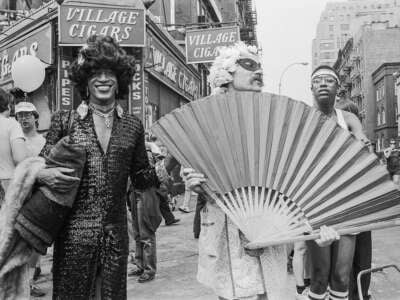Support justice-driven, accurate and transparent news — make a quick donation to Truthout today!
In the years since our now-Vice President J.D. Vance published his disingenuous memoir Hillbilly Elegy — which many Appalachians criticized as “poverty porn” designed to launch his political career — Appalachians have continued our tradition of “talking back.” We published books like What You’re Getting Wrong About Appalachia (2018) and Appalachian Reckoning: A Region Responds to Hillbilly Elegy (2019) to challenge the stereotypes and misrepresentations of the region used by both Vance and the liberal pundits who jumped at the opportunity to blame the 2016 election on us.
While these responses included some depictions of queerness in Appalachia — and while the now-defunct Instagram account Queer Appalachia and its zine Electric Dirt gained significant popularity around this time — there remained a noticeable lack of books specifically focused on LGBTQ life in the region.
Many queer Appalachians felt it was crucial to speak for ourselves, and, in recent years, publishers like Haymarket Books, WVU Press, and the University Press of Kentucky have helped meet that need, releasing a wave of books that highlight the diversity of Appalachian stories.
Uncompromised, uncompromising news
Get reliable, independent news and commentary delivered to your inbox every day.
“[W]hat I have seen is that regional presses (both indie presses and university presses) have really committed to publishing books that represent the South and Appalachia in all their complexity,” Neema Avashia, author of Another Appalachia: Coming Up Queer and Indian in a Mountain Place, told Truthout. “And so, because of that, I do think we are seeing more queer books on the shelves reflecting our stories than we did previously.”
“[T]here’s definitely an upsurge of queer voices breaking into the mainstream traditional publishing platforms,” Davis Shoulders, series editor of University Press of Kentucky’s Appalachian Futures: Black, Native, & Queer Voices and owner of the bookstore Atlas Books in Johnson City, Tennessee, told Truthout. His edited collection, Queer Communion: Religion in Appalachia, is set to be released in October.
“There’s a hell of a boom, and I’m absolutely here for it. I want to lift every voice — Black, Brown, queer, disabled, fat, weird, excluded — across Appalachia,” Willie Edward Taylor Carver Jr., author of Gay Poems for Red States, told Truthout.
“[I]t’s about damn time! There have always been queer and trans people, and writers, in Appalachia and the South. I’m so grateful folks across the region and beyond are getting to hear our stories now, after so many decades of erasure and silencing, internally and externally,” Rae Garringer, founder and director of Country Queers, told Truthout.
These authors told Truthout that it is crucial for queer Appalachians to tell our own stories, preserve the voices of our community, and make sense of our identities in a region where we face political violence and erasure — from both within and outside Appalachia.
“[N]arrative creates meaning. It changes the DNA of the world we live in. We know this instinctively,” Edward Taylor Carver Jr. said. “And for a while, we were on a path — slow for some, faster for others — toward something better. Then fascism shifted the tracks. Now it’s instinct again: speak or die. Tell the story. Change the DNA. We have to wrest the pen back — from the fascists and from the ‘allies’ who use progressive language to climb the ladder, only to snatch the pen away from those they leave behind.”
This pride, Truthout invited these authors to discuss their work, the boom in queer Appalachia stories, and the importance of queer Appalachian storytelling.
Appalachian Authors for Pride Month
In 2017, Garringer wrote a thesis on queerness in Appalachia titled The Republic of Fabulachia: Queer Visions for a Post-Coal Appalachian Future. At the time, I had just completed my master’s degree, started a queer Appalachian zine called Marx in the Mountains, and was captivated by the idea that my identities as Appalachian and queer could coexist with each other. This is what inspired me in 2022 to publish Y’all Means All: The Emerging Voices Queering Appalachia — which gave queer Appalachians the space to describe ourselves — and co-edit Deviant Hollers: Queering Appalachian Ecologies for a Sustainable Future, a collection released in 2024 that explores what exactly is queer about Appalachia.
In the past few years, Garringer has published two books expanding on their work around queerness in the region. Their first book, Country Queers: A Love Letter, published last year, builds on their Country Queers oral history project.
“Country Queers: A Love Letter is a book of photos, oral history excerpts, and my own reflections on a decade of travelling around what is currently known as the United States interviewing rural and small town LGBTQIA2S+ [Lesbian, Gay, Bisexual, Transgender, Questioning, Intersex, Asexual, and Two Spirit] folks. The Country Queers oral history project, which I founded in 2013, was born out of my frustration at how hard it was to find easily accessible rural queer stories about anything other than violence and death, and how absent rural queerness was from both local small town narratives and national queer narratives at the time,” Garringer told Truthout. “The book is a culmination of that 12-year strong project, and includes interview excerpts with folks from Massachusetts to Texas, North Carolina to Arkansas, West Virginia to California.”
Just this year, they also released an edited collection titled To Belong Here: A New Generation of Queer, Trans, and Two-Spirit Appalachian Writers, which features the voices of dozens of queer, trans, and Two-Spirit Appalachians sharing how they make sense of life in the region through poetry and essays.
“To Belong Here: A New Generation of Queer, Trans, and Two-Spirit Appalachian Writers is a collection of essays and poems by a gender expansive, multiracial group of writers raised and/or based in Appalachia. The book wrestles with how we navigate a complicated sense of belonging to a region that doesn’t always love us back,” Garringer said. “I wanted to help create a queer Appalachian anthology that featured more Black, Brown, and Indigenous writers, and more trans writers than previous anthologies from the region had. And I wanted to encourage organizers who I know are brilliant writers, but who aren’t often encouraged to prioritize their creative work over their movement work, to write something for this collection.”
Such queer creative nonfiction — which include essay collections, queer memoirs, poetry collections, and hybrid works that mix all three — has also grown increasingly popular. Notable works include Another Appalachia by Avashia, Tar Hollow Trans by Stacy Jane Grover, and Gay Poems for Red States by Edward Taylor Carver Jr., all of which offer powerful, nuanced perspectives on queer life in the Appalachian region.
Another Appalachia reflects on growing up queer in southern West Virginia as the daughter of Indian immigrants. “My book is about what it was like to grow up in southern West Virginia as the daughter of Indian immigrants in a community where there were very few people of color, and what it was like to make sense of my own queerness in the context of profound silence about queerness. It’s also about how the experiences of my childhood continue to shape how I understand the world today,” Avashia told Truthout. “In some ways, it is an effort to complicate readers’ understanding of Appalachia, and the folks who live there.”
In Tar Hollow Trans, Grover reflects on her transgender identity through the lens of Appalachian culture and tradition. Returning to the landscape of her upbringing, she sought to understand how her personal experiences intersect with the region’s values and the people who shaped her early life. In doing so, she uncovered meaningful links between Appalachian and transgender identities — connections that go beyond a shared sense of marginalization.
Gay Poems for Red States responds to the ongoing harm of anti-LGBTQ+ movements by celebrating the possibility of living a life rooted in pride, beauty, and belonging.
“I wrote Gay Poems for Red States during a moment in my life when so much I had fought for — my 20-year career, the safety of my students, the feeling that I belonged — was under attack by anti-queer extremists,” Edward Taylor Carver Jr. told Truthout. “In that moment, the queer kid I used to be — this kid I once saw as weak and vulnerable — spoke up. He reminded me how strong he was. How much he had always known about survival. And through a series of poems that felt like he was writing them through me, I learned how I would survive, too. Because he taught me.”
His next book, Tore All to Pieces, is a novel that is a “reminder that if we are a painting, then queer folks — gay men and women, trans kids — we can’t be unpainted. We are each other’s context. In all the ways, good and bad.”
This work continues a rich tradition of queer fiction writing in Appalachia. Collections like Walk Till the Dogs Get Mean: Meditations on the Forbidden from Contemporary Appalachia, published in 2015, and LGBTQ Fiction and Poetry from Appalachia, published in 2019, alongside the fiction writing of celebrated authors such as Carter Sickels and Silas House, have long brought vibrant, complex queer stories from the region to life.
For example, Sickels’s The Prettiest Star is set in 1986 and follows a young queer man living with HIV who returns to his hometown in the Appalachian region of southern Ohio.
“I remember what it was like growing up then, and I wanted to document the fear and hatred and cruelty, the intense homophobia, and show how the government, families, media, and churches turned their back on people with AIDS,” Sickels told Truthout. “I also wanted to look at the crisis through the lens of rural America and explore what happens when a queer person, dying of AIDS, returns to the family and the small town that rejected him. It’s a story about a family and place.”
Similarly, House’s Southernmost, Lark Ascending, and The Tulip Poplars (forthcoming in 2026) explore queerness, faith, love, and resistance across vastly different genres — ranging from contemporary drama to dystopian adventure to sweeping historical romance — while centering queer characters in ways that challenge dominant narratives about both the South and Appalachia.
“My main goal in writing about queer characters is to show them in authentic ways. I think too often we’re shown one of two ways: as either fun and partying with limitless resources or miserable and abused. Of course we contain multitudes,” House told Truthout. “In my books I want my queer characters to be multidimensional and I want their orientation to only be one part of them and their story.”
Together, these authors — and the communities they write with and for — are not only queering the canon of Appalachian literature but also asserting that queer and trans people have always belonged in these mountains, shaping the region’s past, present, and future.
The Importance of Queer Appalachian Stories in This Moment
These authors emphasize that queer Appalachian stories are more vital than ever in today’s political climate, pushing back against the dominant narrative that queerness and rural life are incompatible.
Rebecca Scott, co-editor of Deviant Hollers, told Truthout, “Queer stories right now are important across the board. These stories counteract the dehumanization processes going on against trans and queer people, Black and Brown people, Indigenous people, disabled people, and women in Appalachia and across the world.”
“I think queer Appalachian stories are always important, but especially now. I think they offer needed mirrors to queer folks in states whose legislative agendas seek to [enact] profound and lasting harm to queer people,” Avashia told Truthout. “At the same time, I also think they force folks outside Appalachia to reckon with demographic complexity, and not write off entire regions of the country as undeserving of solidarity. Queer people are everywhere in this country, and queer Appalachian stories only underscore that fact.”
Echoing this sentiment, House pointed out the long-standing misconception that queer people do not exist in rural areas. “For one thing, there’s long been this notion that there are no queer people in Appalachia or rural places and that’s obviously not true. So, we need to tell these stories to make sure people know we have existed here for as long as there have been people here,” House explained. “We are going backwards as a nation and it seems like we have been, on LGBTQ issues, ever since marriage equality passed 10 years ago. This whole faction was so outraged by that that they’ve been turning back the clock as hard as they can and the main focus of their bigotry and hatred is aimed at our trans siblings. So, telling these stories is important because being visible is important.”
Sickels expressed the cultural appetite driving this storytelling movement: “I think people are hungry for nuanced, complex, diverse stories that dismantle the stereotypes of Appalachia as this monolith of straightness and whiteness. Queer and trans people, Black people, people of color, immigrants, all live in Appalachia, and it feels important, even urgent, to shine a light on these stories and voices,” Sickels told Truthout. “Queer stories are stories of resistance, community, and survival, and we need those more than ever right now.”
“Appalachia is incredibly powerful,” Edward Taylor Carver Jr. said. “She is Black, Brown, queer, trans, liberal, smart, open-minded, and fierce. She is also all of the other things we say she is. And in every form, she is Appalachian.”
As threats to LGBTQ communities mount across the United States, queer Appalachian authors are not just telling their stories — they are reclaiming the narrative of an entire region and writing a future rooted in visibility, resistance, and care.
“I truly believe that Appalachian country queers are some of the kindest, most creative, most brilliant, and best organized people in the world,” Garringer told Truthout. “I think rural queer and trans folks, especially those of us living in ‘deep red’ states and far from major cities, have a lot of expertise around how to survive these times, and how to take care of each other along the way.”
In the words of Shoulders: “Queer Appalachians are the future.”
Keep the press free. Fight political repression.
Truthout urgently appeals for your support. Under pressure from an array of McCarthyist anti-speech tactics, independent journalists at Truthout face new and mounting political repression.
We rely on your support to publish journalism from the frontlines of political movements. In fact, we’re almost entirely funded by readers like you. Please contribute a tax-deductible gift at this critical moment!
Read full article at source
Stay informed about this story by subscribing to our regular Newsletter


